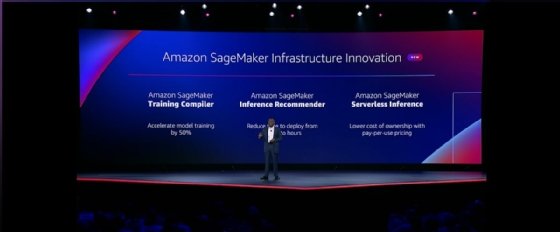
your123 - stock.adobe.com
AWS SageMaker equipped with new features for model building
The tech giant revealed new tools for its AI and machine learning platforms geared toward making model building easier for enterprises and users.
AWS SageMaker is now equipped with new and updated capabilities and tools.
Introduced during this week's AWS Re: Invent 2021 conference, the new features are intended to enable enterprises to better build, train and improve the inference abilities of machine learning models.
"All of these announcements are basically aimed at driving increased adoption of AWS's AI/ML capabilities by making the life of the developer and data scientist simpler," said Sid Nag, an analyst at Gartner.
Nag said the new tools enhance SageMaker's AI and machine learning (ML) capabilities to drive increased productivity.
New innovations for SageMaker
SageMaker Training Compiler -- one of three new SageMaker tools -- appears particularly interesting because it accelerates the task of building deep learning models, Nag said.
During a keynote presentation, Swami Sivasubramanian, vice president of AI and machine learning at AWS, said Training Compiler speeds up training of deep learning models by up to 50% "through graph and kernel-level optimizations that make more efficient use of GPUs." The feature is turned on by default for SageMaker users.
The new capability is noteworthy since "training machine learning models can be very challenging and is prone to errors if not done correctly,” Nag said.
The training compiler integrates TensorFlow and PyTorch, and uses fewer memory and compute resources, allowing users to train their models faster.
Another new capability is SageMaker Inference Recommender. Sivasubramanian said the feature makes inferencing simpler for customers and can "reduce the time to deploy ML models from weeks to just hours." Inference Recommender is available in all AWS regions where SageMaker is available, except for the Osaka region of Japan.
AWS also introduced SageMaker Serverless Inference. Sivasubramanian said the feature enables AWS to manage the infrastructure for inferencing. It is currently available in preview.
"All of these new SageMaker features are going to make it a lot easier for you to scale machine learning in your organization," he said.

SageMaker Ground Truth Plus
Other new SageMaker offerings include SageMaker Ground Truth Plus, a service that helps organizations train data sets faster.
Ground Truth Plus provides machine learning-based based labeling techniques including active learning, free labeling and machine validation. The feature labels and manages workflows based on the unique requirements of the enterprise, while reducing the time spent on labeling data sets, according to Sivasubramanian.
New features in SageMaker Studio
AWS also introduced three new features for its SageMaker Studio service. According to Sivasubramanian, AWS customers have complained that to get the most value from the data in SageMaker Studio notebooks, they often need to do data engineering and analytics using separate notebooks.
To address this problem, SageMaker Studio now includes data processing, analytics and machine learning workflow capabilities.
"From this universal notebook, you can access a wide range of data sources and write code for any transformation for a wide variety of data workloads," Sivasubramanian said. "This will make it a whole lot easier for users to innovate with data in a number of different ways."
With Studio, data scientists can discover, manage, create, terminate and connect to Amazon EMR clusters; use templates; and connect to, debug and monitor Spark jobs running on an Amazon EMR cluster. A template is a group of cluster configurations optimized for different workloads.
The new features in SageMaker Studio are available without any additional charges in central Canada, certain regions in the United States, Europe, Asia Pacific and South America.
SageMaker Studio Lab
Also available in preview is Amazon SageMaker Studio Lab. Lab is a free service that allows anyone to learn and experiment with machine learning without an AWS account, credit card or cloud configuration knowledge.
Studio Lab is based on the open source JupyterHub technology, and to sign up users must mention whether they need a CPU or GPU for their projects.
Studio Lab users can use the platform to take part in the AWS Disaster Response Hackathon, which runs until Feb. 22.







